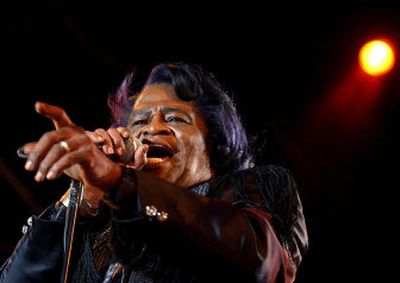‘Godfather of Soul’ James Brown, 73, dies

James Brown, the high-energy “Godfather of Soul” who left his signature beat on funk, R&B, disco and rap and electrified generations with his riveting onstage performances, died early Monday at Emory Crawford Long Hospital in Atlanta. He was 73 and had been hospitalized with pneumonia since Sunday.
Brown’s music transcended generations and musical genres, beginning in the mid-1950s and continuing to the present. His sliding, gliding, sweat-breaking dance steps and splits and jumps brought audiences to their feet the world over. With his pompadoured hair, showy outfits and a repertoire of songs that defied inertia, he was a phenomenal performer.
As one of the major musical influences of the past 50 years, he remained in a rarefied league with Elvis Presley, Bob Dylan and few others. Brown, also called the “hardest-working man in show business,” was a visionary and an innovator who pushed music to new places. He also was a songwriter, bandleader, record producer, philanthropist and civil rights activist.
Despite a life plagued with personal problems and run-ins with the law, Brown continued to wow audiences with his throaty vocals and pulsating rhythms. He had planned to appear in New York on New Year’s Eve, said his agent, Frank Copsidas.
Over the years, Brown sent audiences into various states of frenzy when he dramatized his first R&B hit, “Please, Please, Please” (1956), on stage. As a finale, Brown would walk off stage, body bent with fatigue. He would stop, drop to one knee and wait for a band member to drape a cape around his shoulders. As he was being led away, Brown would toss the cape off, run to the microphone and start begging again, “Baby, please don’t go, don’t go … I love you so.” The audience would go wild as band members wailed on their horns.
Brown changed the course of African American music in the 1960s and 1970s, said Henry Louis Gates Jr. and Cornel West in their book, “The African-American Century: How Black Americans Have Shaped Our Country” (2000).
“Mr. Brown, as he likes to be known, rapped and crooned before his time, used vibrant horn, raunchy rock and roll guitar, and driving bass overlaid with a grunting, familiar voice like the sound of a moving train,” Gates and West wrote. “His persona prefigured the flamboyance of the disco years, of techno-funk humor, of the era of his royal highness known as Prince.”
Michael Jackson and Mick Jagger aspired to dance like Brown; Elvis Presley was said to have studied Brown’s choreography on film.
His signature one-three beat can be heard on music from Ice-T, the Fat Boys, Public Enemy and many others who used the digital technique known as sampling to incorporate Brown’s lyrics and rhythms into their own works.
Brown’s live recording at the famed Apollo Theater in October 1962 was considered a pivotal event in his career and was declared one of the greatest 100 moments in rock music in the 1960s by Entertainment Weekly. The recording, which was released three months later, “marked the beginning of Brown’s transformation from minor R&B star into soul’s greatest bandleader,” the magazine said in 1999.
In 1965, Brown’s “Pappa’s Got a Brand New Bag” won a Grammy for best R&B recording, and in 1987, his “Living in America” single, which is heard in the movie “Rocky IV,” received one for best male R&B vocal performance. In 1992, he won a Grammy award for lifetime achievement.
He was one of the initial artists inducted into the Rock and Roll Hall of Fame, in 1986, along with Elvis Presley, Chuck Berry, Sam Cooke, Fats Domino and Buddy Holly. In 2003, he was honored by the John F. Kennedy Center of Performing Arts.
In a statement Monday, President Bush called Brown “an American original” and noted that his fans came from all walks of life.
Drug and alcohol problems occasionally got in Brown’s way. In 1988, he was high on PCP and carrying a shotgun when he entered an insurance seminar next to his Augusta office. He then led police on a half-hour chase from Augusta into South Carolina and back to Georgia.
Brown received a six-year prison sentence and spent 15 months in a South Carolina prison before being paroled in February 1991.